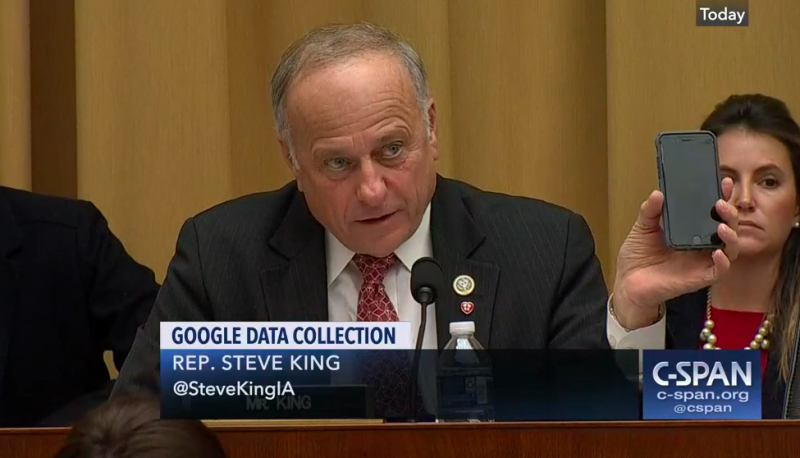From the outset, yesterday’s House Judiciary Committee hearing on the practices of Google was destined to be a bit of a circus, what with Infowars host Alex Jones holding court in a hallway outside the hearing room, railing against the tech giant, which removed his web-based programs from its YouTube platform, for violating Google’s own terms of service which forbid hate speech and harassment. Roger Stone, the self-described “dirty trickster” and Trump adviser who appears to be a target of the Mueller probe, stood nearby. Then there was the guy sitting behind Google CEO Sundar Pichai dressed as the Monopoly Man of Parker Brothers fame, complete with top hat, monocle and exuberant mustache.
Watching the proceedings, however, you’d be forgiven for thinking it was a show led by ornery old men who hadn’t quite figured out how the intertubes work.
The hearing was spurred by complaints from Republicans who claim that “conservative voices” are muted by Google in its searches, which they claim favor “liberal” media. What they don’t tell you is that counted among their idea of “liberal media” are virtually all mainstream news outlets—the places where most Americans get their news. President Trump, for example, claims that only negative stories about him appear in the top range of Google search results. It couldn’t be that Trump is doing things that have objective measures, such as telling lies, that mainstream media are compelled to report, or that CNN.com has a bigger following than Breitbart.
The Daily Beast’s Will Sommer tweeted that a study cited to make that point by Rep. Lamar Smith, R-Texas, appeared to be based on less-than-scientific standards.
The Google hearing has kicked off! A GOP congressman is grilling Google’s CEO over a PJ Media “study” that proves Google favors liberal search results. The whole study is based on this chart from notorious kook Sharyl Attkisson. pic.twitter.com/R29vjF7JwT
— Will Sommer (@willsommer) December 11, 2018
Or it couldn’t be that an algorithm has picked up an abundance of pairings of the word “idiot” with images of Trump—to the point at which Trump’s image fills the page if you search the word “idiot” and then click on “images”. (Go ahead, try it—and thanks, Rep. Zoe Lofgren for the tip!) No, it must be that the nefarious communist coders at Google have it in for Trump.
Among elected officials, House Majority Leader Kevin McCarthy, R-Calif., has taken up the right-wing cause of a war on “shadow-banning” and other supposed Silicon Valley suppression of right-wing content.
Speaking of Twitter last September on Fox News Channel’s “Ingraham Angle,” McCarthy explained, “What happens on shadow-banning is you put something up; nobody sees it.”
In fact, back in August, McCarthy accused Twitter of shadow-banning a Laura Ingraham tweet because it showed up in his feed with its content obscured by text saying “This Tweet is not available because it includes potentially sensitive content.” This prompted a torrent of responses pointing out that McCarthy received that message in lieu of Ingraham’s tweet content because of McCarthy’s own personal settings on his Twitter account. Not that he’d let that keep him out of the shadow-banning wars.
Another day, another example of conservatives being censored on social media. @jack easy fix: explain to Congress what is going on. #StopTheBias cc @IngrahamAngle pic.twitter.com/QjzpmfadXS
— Kevin McCarthy (@GOPLeader) August 17, 2018
And so McCarthy was invited by committee Chairman Bob Goodlatte to open today’s hearing, which he did by telling Google CEO Sundar Pichai that “we need to know that Google is on the side of the free world, and that it will provide its services free of anti-competitive behavior, political bias and censorship.”
As the committee’s ranking member, Rep. Jerrold Nadler, D-N.Y., was next up with a stinging rebuke of Republicans’ complaints of a purported tech-world vendetta against “conservatives.”
“I must first dispense with a completely illegitimate issue, which is the fantasy, dreamed up by some conservatives, that Google and other online platforms have an anti-conservative bias,” Nadler said. “As I have said repeatedly, no credible evidence supports this right-wing conspiracy theory.”
From time to time, important questions about Google’s development of a censorship-friendly product for the Chinese market or Google’s use of consumer data poked through (Pichai seemed evasive), but the font of right-wing resentment over poor showings in the search engine and social media universe dominated.
Rep. Ted Poe, R-Texas, pointed an accusatory finger at Pichai on the topic of location data, demanding to know if Google could tell where he was in the unlikely event that he crossed the room to sit with his colleagues across the aisle. Pichai replied that he’d have to know which apps Poe had on his phone, and his personal settings. Poe snapped that it “wasn’t a trick question.”
“It’s a yes-or-no question!” Poe shouted.
With which even Luke Ball, whose Twitter profile identifies him as an aide to Rep. Matt Gaetz, R-Florida, had some fun:
#GoogleHearing so far:
Rep: “Does the Googles know when I FaceTube my email messages?”
Pichai: “Uh… do you mean-”
Rep: “It’s a yes or no question!!!!!!!”
— Luke Ball (@lukedaballer) December 11, 2018
Rep. Louie Gohmert, R-Texas, took exception to YouTube’s partnership with the Southern Poverty Law Center (SPLC) as a “trusted flagger” of dangerous content that violates the platform’s terms of service. CNN’s Oliver Darcy reported Gohmert as saying, “The Southern Poverty Law Center has really stirred up more hate than any other group that I’ve known.”
Gohmert is now speaking at the Google hearing. He is upset YouTube reportedly partners with the SPLC as for its “trusted flagger” program.
“The Southern Poverty Law Center has really stirred up more hate than any other group that I’ve known.”
— Oliver Darcy (@oliverdarcy) December 11, 2018
Rep. Steve King, the white nationalist Republican congressman from Iowa, demanded from Pichai the names of Google employees who write the algorithms that King contends demonstrate a bias against “conservatives” in internet searches, so that Congress could inspect the coders’ own social media accounts, presumably to determine whether or not they are liberals.
“We don’t know what their social media looks like,” King said, “but we do know that people that come from that county (California’s Santa Clara, where Google is headquartered) are about 80 percent supporters of Hillary Clinton …, so that would be a built-in bias, if I know people from California and know their politics from California, and I think I do.”
King also demanded that Pichai tell him how King’s 7-year-old granddaughter wound up seeing a photograph of her grandfather, accompanied by inappropriate language, pop up on her iPhone during the midterm campaign.
“Congressman, the iPhone is made by a different company…,” Pichai replied.
Snickers were heard.
Clip via The Daily Beast








